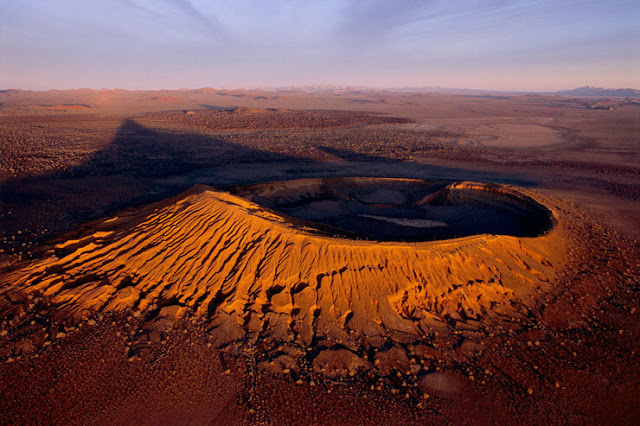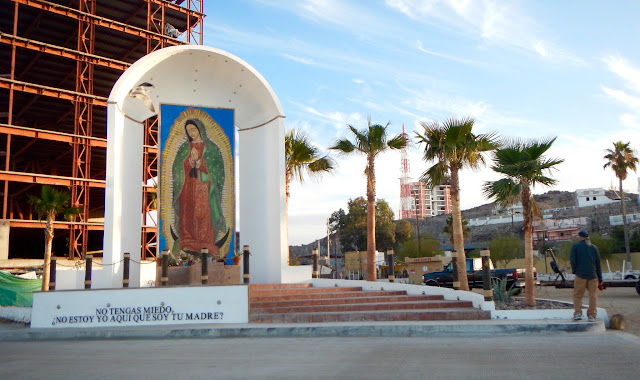Being happy doesn't mean everything is perfect.
It means you decide to see beyond the imperfections.
Unknown
 |
| Very rare snow on Pinacate De Frente, local newspaper picture |
December flew by as quickly as the fading sounds of the fireworks ending it and 2015. Another month spent getting Déjàlà in top shape after extended storage, which is never easy on anything.
Mike is asleep, Nikki at his feet, snoring loudly. Now nearly 13, she sounds like a small pig when she snores, hence her new nickname, Piglet.
El Niño, at least that is what we are blaming these days, is making this area colder than usual which has considerably slowed down our progress. Epoxies, glues, and paints can be very sensitive to temperature and humidity so we have to apply them weather permitting. We are making great strides but are getting increasingly impatient for warmth and our return to sea.
We promised ourselves however that we would keep exploring the area, that all wouldn't be just work and no play.
 |
| Pinacate beetle |
 |
| El Colorado crater |
 |
| El Elegante crater |
We visited the El Pinacate Biosphere, a beautiful albeit quite stark, volcanic desert area intermixed with miles of sand dunes boarding the Sea of Cortez. What contrasts, especially when a very rare pure white snow covers the 3,900 foot peak, black volcanic rocks in the foreground.
Learned a definition of the desert we hadn't seen before... Potential evapotranspiration or the amount of water that could evaporate in any given region is more than what is received. As an example, Tucson, Arizona receives about 300 mm (12 in) of rain per year, however about 2,500 mm (98 in) of water could evaporate over the course of a year. In other words, about eight times more water could evaporate from the region than actually falls as rain. It helped us get a better perspective on just how much water would be needed to turn this desert into a non-desert!
 |
| Lara and Salvador Picture from SV Cayenne |
 |
| Notice the noose... |
We attended the wedding of a third generation local. The generosity of the Mexicans never ceases to impress us. We barely knew the people who opened their beautiful home to us for a couple days of celebration. We are so thankful.
We walk around with Nikki, on the beach as often as possible. Life is quite simple really!
We meet and learn more about the locals each and every day.
A few other sailors are working on their boats too. Represented are Austria, Australia, Honduras, Canada, and the US. Not bad for only five boats. We learn from fellow sailors.
 |
| After and --- before |
We had hoped to be in Mazatlán by now but schedules are not as important as they once were. Work well done, not rushed, is more important.
Déjàlà now showcases a propeller for the first time since we have owned her. We still have an electric motor but it is inboard instead of outboard. The propeller is designed to make power while underway, another new feature. Before, we utilized a tow behind generator that was difficult to use when near land for it would get caught in kelp, nets or fishing lines.
Of course we still have solar panels as our main source of power but they have been replaced by very thin (1/8") flexible panels. Thanks to this new technology, Déjàlà now sports a much more streamlined look. Our old panels will partially power the home of a local.
Déjàlà is wearing a new wardrobe: her interior's old blue and gold cushions have been replaced with light green and wheat colors to match the light green of the new outside canvas covers. Spiffy!
Other than the usual replacement of worn parts, we now have a new and more efficient Engel freezer/fridge, a new Gennaker (type of sail) that dwarfs any of the other sails we have, a new salt water wash down pump, a new windlass, new batteries, and a new hard dodger to support the solar panels.
Surprisingly for a Mexican town, Puerto Peñasco has been fairly quiet. Not sure if it relates to the cold weather. When we were first here in October we were guaranteed Mariachi music at least 2-3 times per week late into the night. When you think that a rally of 5,000 Harleys is quieter than a single band of Mariachi music you start to understand the level of decibels we are talking about. If only it was in tune we might sleep through it!
What we see as poverty is still commonplace in Mexico but locals living on about $400-$500/month (the national average) seem happy! I still wonder where Mexicans got the reputation of being lazy when the majority work 45-55 hours/week, some closer to 70 hours! They may have different ways of seeing work or different standards but I would not call them lazy. Since we are in a boat yard, these hours can be very varied, some dependent on tides. If high tide is at 3am, you come to work then...
Some new items we have learned along the way.
- Steel cutting is only done with propane, no acetylene here! Slow and tedious. US welders wouldn't like it.
- You cannot legally buy hybrid cars, they are not yet available in this country...
- They haven't quite figured out what wheelchair access ramps mean. I will let this picture speak to that...
- Two main items that get recycled are aluminum cans and wood. Aluminum for cash, wood to heat water, your food or home. Electricity is so expensive in residential areas in Mexico that many cannot afford it so they use wood... You won't see any wood laying around for very long especially in the cold season.
- There is a special license plate for cars that do not have legitimate or complete paperwork! Some politician needed to score points with the populace and came up with that rule. When you see this type of license plate, it means the car could have been considered totaled by insurance, stolen, missing a VIN number, etc.
- Shrimp boats and most large fishing fleets use Spectra fishing nets. This material is comparable in strength to stainless steel... No fish is going to escape here. Just the other day a shrimp boat came in with a 4,000 pound mooring caught in its net. It didn't damage the net but they had to use a crane at a dock to get it off the boat so they could resume business. Somewhere an owner of a mooring is wondering what happened to it...
- No new permits for catching shrimp have been issued in 15 years. That business is extremely regulated. All boats are followed via satellite to see if they may be out of bound, etc... Serious repercussions if they are. Should they catch ANY turtles, they have to stop everything and release it. Owners of these fleets would rather their team get caught with drugs than turtles, less negative repercussions.
- The other day we went to a store where one can buy tools or have them repaired. Something you can no longer find in the US. There it is usually cheaper to buy a new tool rather than having it repaired. Here, for a flat fee of about $7.50 your tool will be fixed. When you pick it up. They let you leave with the fixed tool and walk across the street to pay for the repair! Wow... Trusting...
- Stores and many businesses are not heated. People show up to work in their winter clothes, scarves, hats, gloves, and all. When the day starts at 37F, it makes for a cold long day at the cash register of a grocery store.
- If you are given grapes on New Year's Eve, twelve of them are to be eaten, one for each of the twelve strokes of midnight as the clock strikes.... Eat fast. It is for good luck for the upcoming year.
- Here in Puerto Peñasco, the special day for the Virgin of Guadalupe is December 12. Many fishing boats come back in town for the occasion even though they may not have full cargo.
- You know labor is paid little when it is cheaper to have new bearings poured by hand rather than purchased. The gentleman in the accompanying picture is making Babbitt (type of metal) bearings for a fishing boat, the white stuff at the bottom is corn flour mixed with water so the melted metal doesn't flow out and away...











No comments:
Post a Comment
We are always happy to hear from you but at times it may take a while to get a reply - all depends if we have access to the internet.